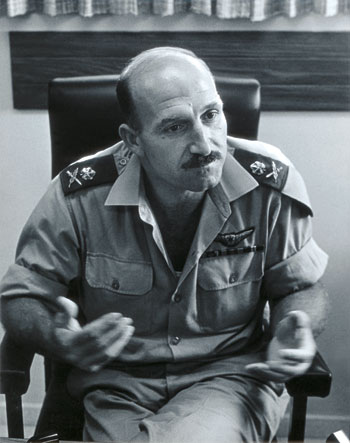Born: September 28, 1926
Died: June 30, 2003
Israeli Air Force (IAF) major general who commanded the IAF during the Six-Day War in June 1967. Born on September 28, 1926, at Kibbutz Degania on the Sea of Galilee in British-administered Palestine, Mordechai Hod was a career soldier. He served initially with the British Army (1944-1947) and later joined the IAF as one of its first fighter pilots. Earning his pilot’s wings early in 1949, he rose quickly through the ranks, holding positions both as squadron commander (1955-1956) and base commander (1957-1959) before his promotion to deputy air commander (1962-1966). In the latter post he served under Ezer Weizman, a tireless advocate of the expansion and modernization of the air force. As Weizman’s successor in April 1966, Hod (promoted to major general in April 1967) continued that process during his seven years (1966-1973) in command of the IAF.
Hod brought a new spirit and sense of direction to the IAF when he assumed command. Less hesitant than Weizman about engaging in conflict, Hod allowed his fighters to seek out and engage in dogfights with Arab aircraft. Within mere months of taking control of the IAF, he oversaw the Israeli downing of several Syrian MiGs as well as aerial combat with Jordanian aircraft over the West Bank. In August 1966 he also benefitted from the carefully planned, yet fortuitous, defection to Israel of an Iraqi Christian pilot who flew his MiG-21 to an IAF airfield. This event allowed the Israelis to learn the weaknesses and strengths of the frontline fighter of their Arab enemies, an advantage that would help IAF pilots secure victory in the air.
IAF domination of the Middle Eastern skies was further bolstered in 1969 by the delivery of U. S. F-4 Phantoms. The new planes provided the Israelis with so potent a strategic capability that it unbalanced the regional power dynamics and led the Soviet Union to send hundreds of pilots and antiaircraft personnel to help defend Egypt. Under Hod the capabilities of the IAF were therefore revolutionized much as they were a decade earlier by the acquisition of French-made Mirage fighters when Weizman commanded the air force.
The high point of Hod’s lengthy military career was undoubtedly the stunning success achieved by the IAF during the 1967 Six Day War. In a bold and daring operation, largely masterminded by Israeli chief of staff Lieutenant General Yitzhak Rabin, and the product of more than a decade of intensive training and drilling of pilots and ground crews, the IAF launched a series of coordinated surprise attacks on Egyptian airfields on the morning of June 5, 1967. Within hours more than 300 Egyptian planes were destroyed, most of them on the ground, effectively eliminating the Egyptian Air Force as a factor in the conflict. Over the course of the day, the IAF delivered similarly devastating attacks against Syria, Jordan, and Iraq, securing for Israel complete mastery of the skies and providing its ground forces the tactical advantage needed to win a spectacular victory on all fronts. However, Hod would later note that the great success achieved on the battlefield was indeed a mixed blessing, as the expansion of Israel’s borders planted the seeds for decades of further conflict.
Retiring from the military in 1973, Hod founded Kal, a company specializing in the transportation of agricultural products by air. Later in the 1970s he served as the chief executive officer of El Al, the Israeli national airline, and during 1987-1993 he chaired the country’s aerial industrial board. In 1995, at the age of almost 70, he earned a PhD in business management from Pacific Western University in Los Angeles, California. Hod died in Tel Aviv, Israel, on June 30, 2003.
References Braverman, Libbie L., and Samuel M. Silver. The Six-Day Warriors. New York: Bloch, 1969. Hammel, Eric. Six Days in June: How Israel Won the 1967 Arab-Israeli War. New York: Scribner, 1992. Neff, Donald. Warriors for Jerusalem: The Six Days That Changed the Middle East. New York: Linden, 1984. Weizman, Ezer. On Eagles’ Wings: The Personal Story of the Leading Command of the Israeli Air Force. New York: Macmillan 1977.
